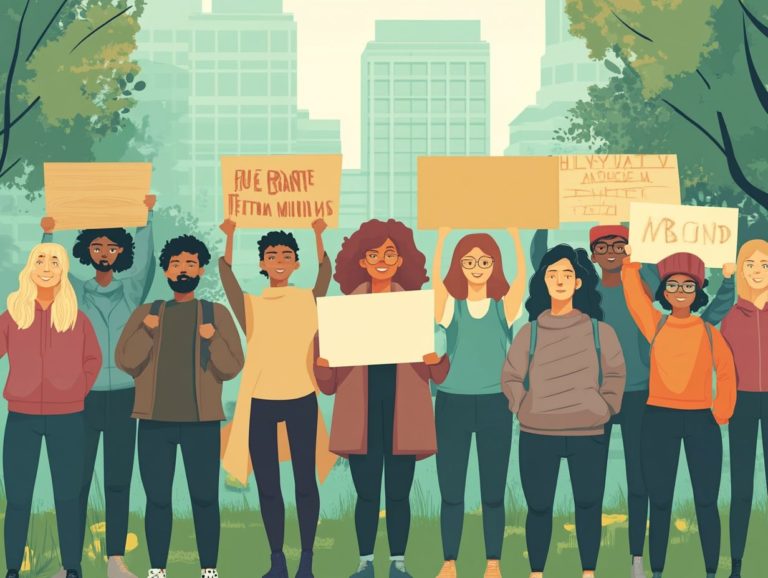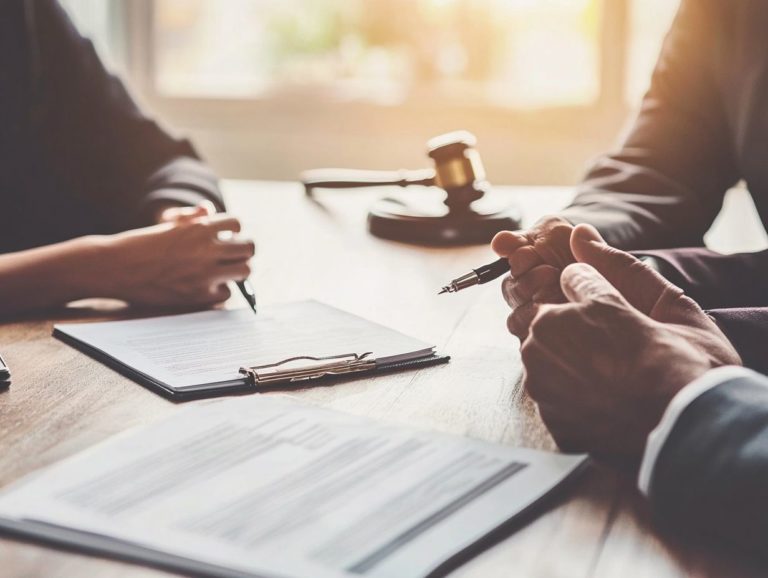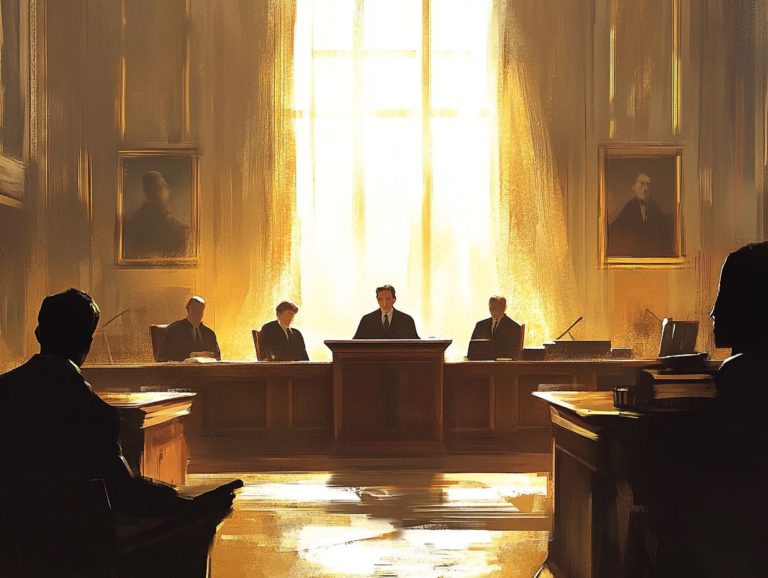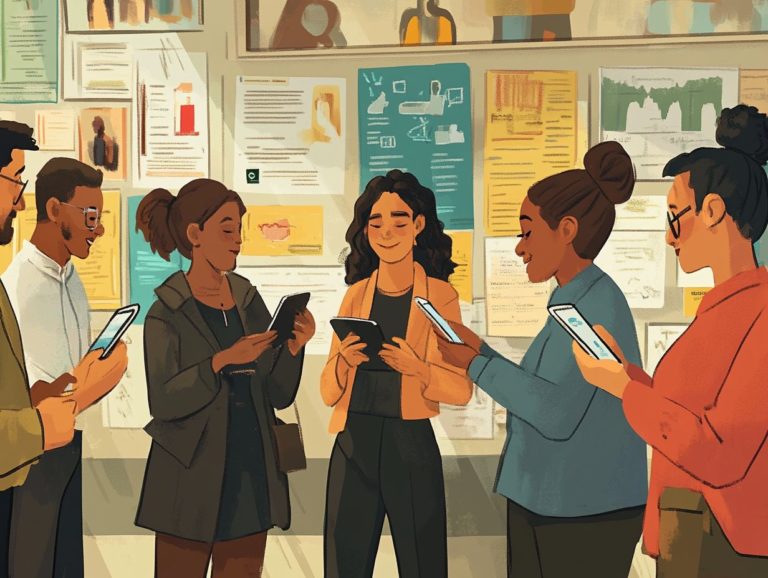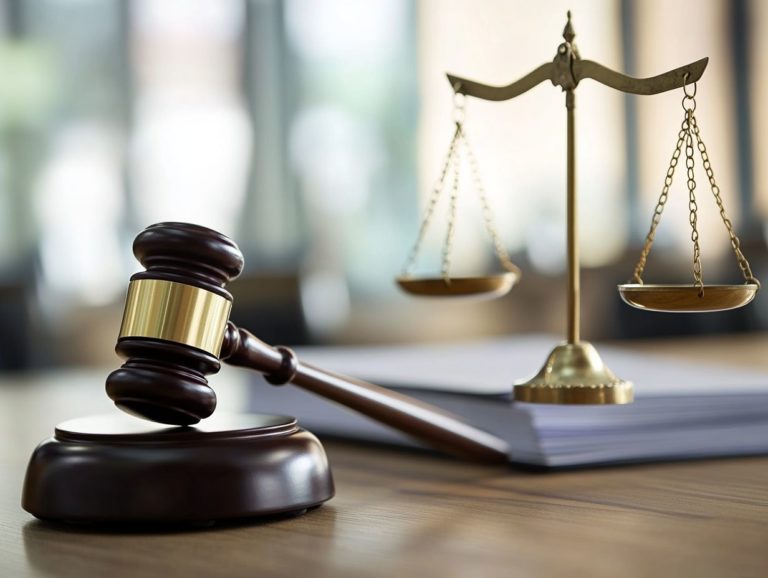Exploring the Rights of Victims and Accused
In the intricate landscape of the justice system, the rights of both victims and the accused are pivotal in fostering fairness and equity.
This article delves into the definitions and types of rights granted to each party. It emphasizes the significance of maintaining a delicate balance.
You will discover the challenges encountered in safeguarding these rights and the ongoing efforts to enhance the justice system for all involved.
Join us as we explore this important topic together!
Contents
- Key Takeaways:
- The Rights of Victims
- The Rights of the Accused
- Balancing the Rights of Victims and Accused
- Challenges in Upholding Rights for Both Parties
- Improving the Justice System for All
- Frequently Asked Questions
- What rights do victims have in the criminal justice system?
- Do victims have the same rights as accused individuals?
- What is the role of victim advocates in the criminal justice system?
- What rights do accused individuals have in the criminal justice system?
- Can a victim’s rights conflict with the accused’s rights?
- How can I learn more about the rights of victims and the accused?
Key Takeaways:
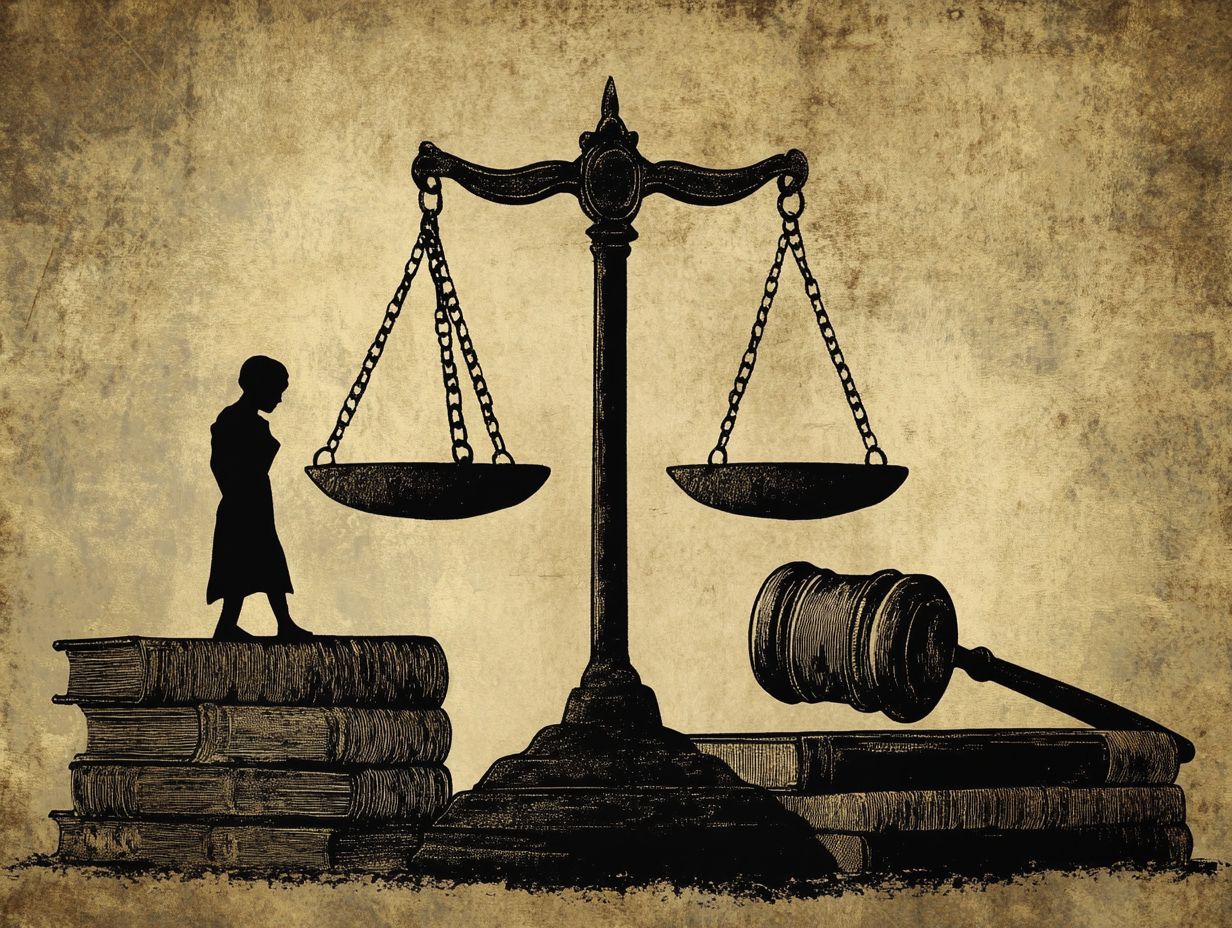
Victims have the right to be protected, informed, and involved in the criminal justice process. The accused have the right to a fair trial, legal representation, and protection from self-incrimination. Balancing the rights of both parties is essential for a just and fair criminal justice system and requires addressing biases and systemic issues.
The Rights of Victims
In the realm of the criminal justice system, the rights of victims take center stage. They emphasize the importance of acknowledging and preserving the dignity of those who have endured harm from crime.
These rights are firmly established in the California Constitution and are crafted to guarantee that victims receive the necessary assistance and support throughout the legal journey. This includes access to victim assistance programs, emotional support services, and pathways for effective victim advocacy.
Recognizing these rights is essential for creating a caring environment that understands trauma. It also gives power to them to pursue justice with confidence and strength.
Defining Victim Rights
Victim rights encompass the legal rights granted to individuals who have suffered harm due to criminal activity. They highlight the right to procedural justice and sensitivity throughout the judicial process.
These rights are essential in ensuring that you, as a victim, are not only acknowledged but also actively involved in the legal proceedings that influence your life. The right to be informed equips you with crucial updates about your case, allowing you to make informed decisions.
The right to participate in court hearings is vital. It enables you to express your perspectives and emotions, fostering a sense of power to comment. The right to seek financial compensation recognizes the economic toll of crime and serves as an important step toward recovery, helping you rebuild your life.
These provisions create a more compassionate and equitable judicial system. They reinforce the belief that victims deserve respect, support, and ultimately, justice.
Key Victim Rights You Should Know
Victims’ rights encompass several essential categories, including the right to assistance, timely notifications throughout the judicial process, emotional support during legal proceedings, and financial compensation via restitution orders.
Each of these rights is pivotal in empowering individuals who have endured harm. The right to emotional support acknowledges the psychological ramifications of victimization and serves as a crucial resource for healing and recovery.
When you have the opportunity to file a victim impact statement, your voice resonates in court. It articulates the personal consequences of the crime and advocates for a justice response tailored to your experience.
Restitution rights are crucial for recovery don’t overlook their importance. They provide a financial remedy, enabling you to recover losses while fostering accountability among offenders. Collectively, these rights cultivate recognition and validation two fundamental elements necessary for rebuilding lives after trauma.
The Rights of the Accused
In the realm of criminal justice, the rights of the accused stand as a vital cornerstone. They ensure fairness and uphold the principle of procedural justice.
This guarantees that individuals facing charges are afforded equal protection and access to justice throughout the legal proceedings.
Defining Accused Rights
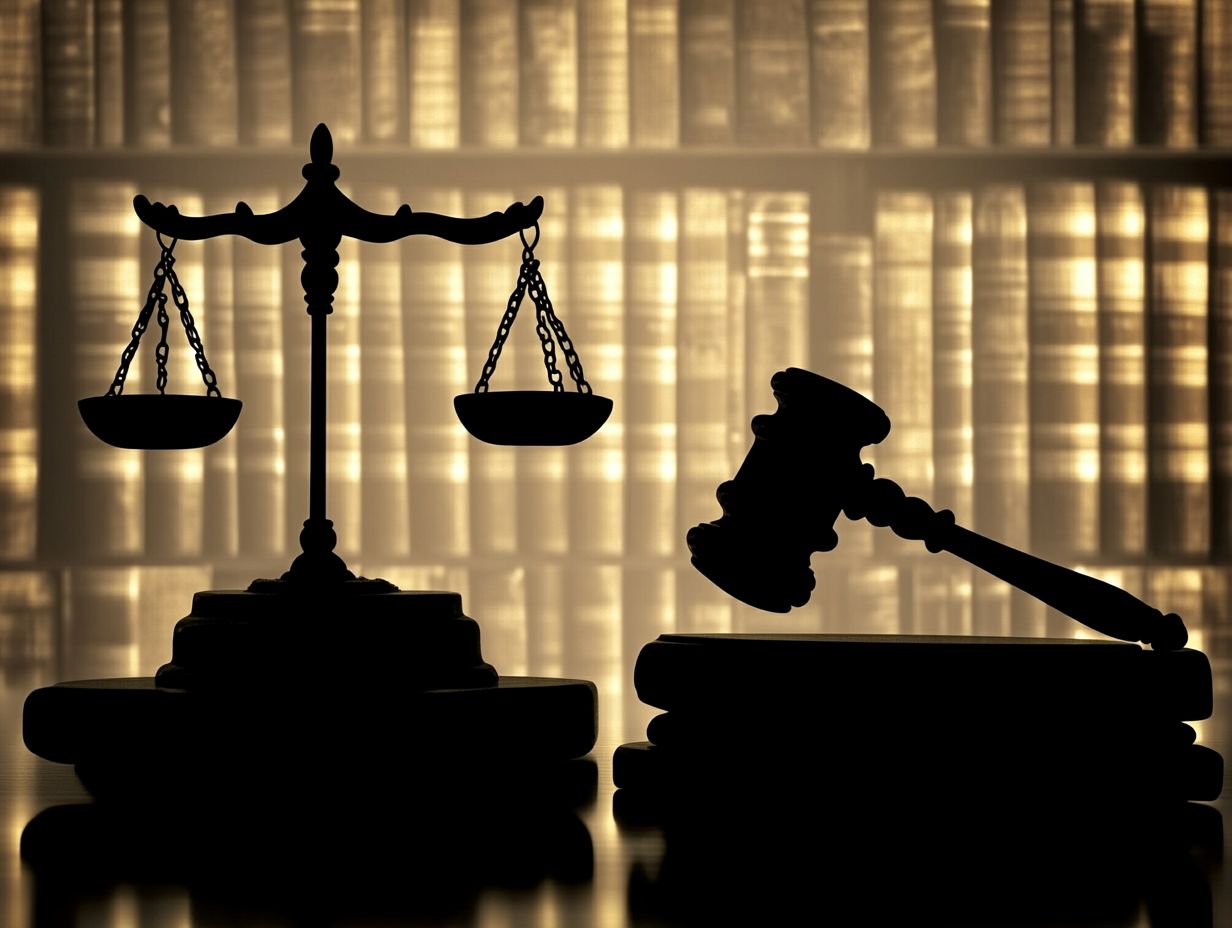
Accused rights include the legal protections and entitlements you possess when facing criminal charges. These include access to legal representation and the right to a fair trial, both of which are fundamental to maintaining the integrity of the criminal justice system.
These rights ensure that you are treated with dignity and respect while also upholding the principle of presumption of innocence. This allows you to defend yourself against allegations without bias from the legal system.
As you navigate the complexities of criminal trials, understanding your rights can significantly impact the outcome. It empowers you to seek justice and challenge any potentially unlawful practices.
Ultimately, these rights help maintain public trust in the judicial process, fostering a system where accountability and fairness reign supreme. This, in turn, enhances the legitimacy of legal outcomes for society as a whole.
Types of Accused Rights
Types of accused rights include the presumption of innocence, the right to a lawyer, and the right to a fair trial. These rights are essential for upholding the integrity of the legal process.
These rights act as foundational pillars of justice, ensuring that you are treated fairly and equitably when facing legal scrutiny. The presumption of innocence places the burden of proof squarely on the prosecution, protecting you from wrongful convictions.
The right to a lawyer ensures that you have access to legal expertise, empowering you to navigate the often complex legal landscape with confidence. The right to a fair trial also ensures that you will be judged by an impartial jury, reinforcing the very essence of justice.
Consider the landmark case of Gideon v. Wainwright. The U.S. Supreme Court highlighted the vital importance of legal representation. This ruling made it clear: states must provide lawyers for those who can’t afford one, illustrating just how crucial these rights are in fostering a just legal environment.
Balancing the Rights of Victims and Accused
Balancing the rights of victims and the accused is a nuanced undertaking. It is essential for maintaining the fairness and integrity of the criminal justice system.
It is crucial that both parties are treated with dignity while also ensuring procedural justice and access to justice are upheld.
The Importance of Fairness
Fairness in the judicial process is essential for upholding the rights of both victims and the accused. It ensures that everyone receives equitable treatment while fostering trust in the criminal justice system.
When justice is applied consistently and transparently, it reassures victims that their voices matter. At the same time, it offers the accused hope that they will be treated justly and without prejudice. This balance is crucial; it contributes to a perception of legitimacy within the legal framework.
When the public witnesses fair proceedings, it cultivates a belief in the integrity of the justice system. Without such fairness, a gap may form, eroding confidence and perpetuating skepticism about the effectiveness of legal outcomes.
Challenges in Upholding Rights for Both Parties
Upholding the rights of both victims and the accused within the criminal justice system involves facing various challenges.
Issues in the system and biases can make it hard to navigate the judicial process, ultimately shaping the experiences of both parties in profound ways.
Addressing Biases and Systemic Issues
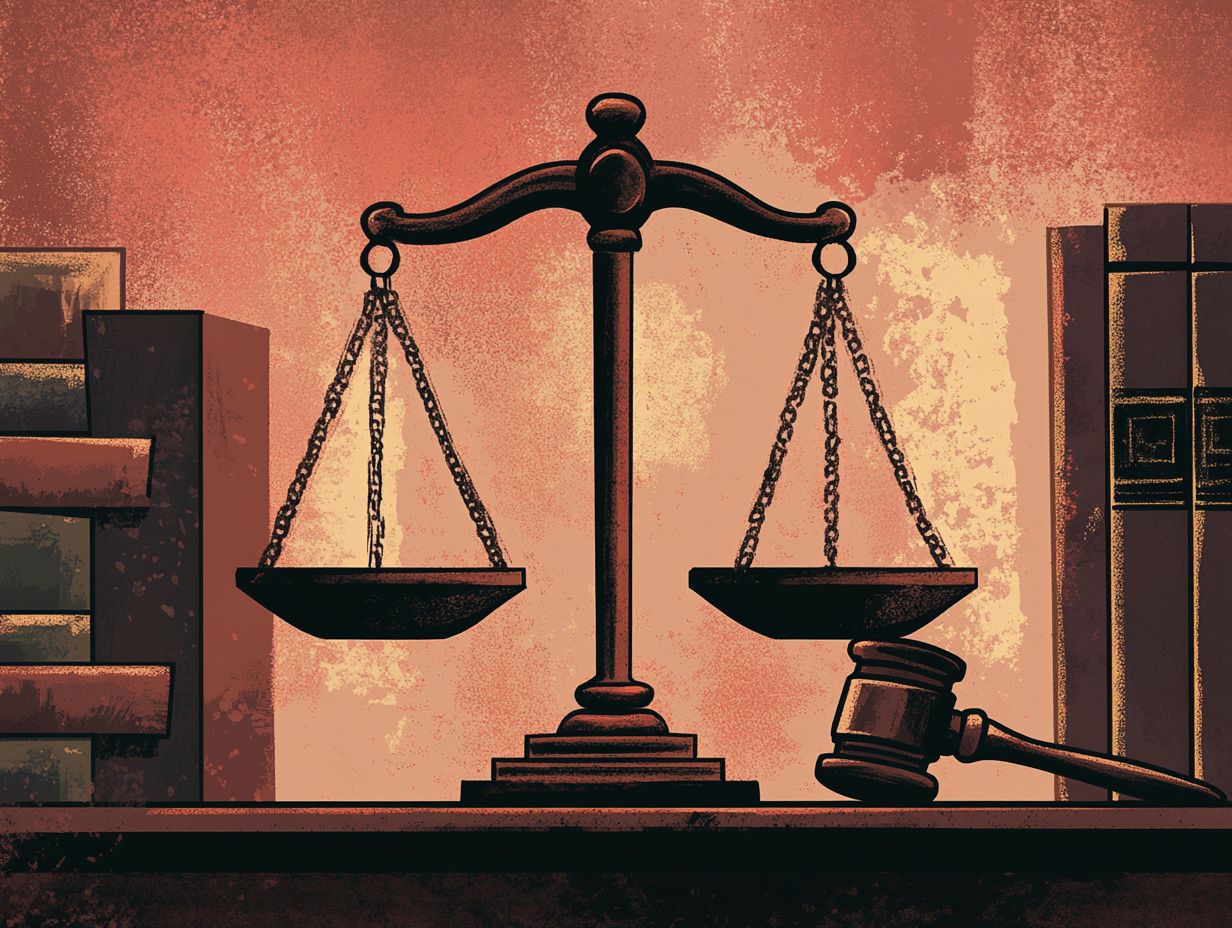
Addressing biases and systemic issues within the criminal justice system is essential for ensuring victim sensitivity and achieving fair treatment for everyone involved, including both victims and the accused.
These biases often come from societal stereotypes, socioeconomic disparities, and prior experiences that shape interactions with law enforcement and legal proceedings. This complexity can complicate the pursuit of justice and place additional burdens on individuals who are already vulnerable.
Legal professionals are crucial in navigating these challenges. Their understanding of biases can greatly influence case outcomes.
To effectively combat these issues, it s imperative to prioritize comprehensive training and continuous education focused on fairness, empathy, and the systemic barriers faced by all parties.
Such initiatives not only create a more equitable judicial environment but also enhance the overall integrity of the justice system. They pave the way for restorative outcomes that benefit everyone involved.
Improving the Justice System for All
Enhancing the justice system for everyone calls for a thoughtful and holistic approach that considers the needs of both victims and the accused.
It s essential to uphold victims rights while simultaneously providing the accused with the support and legal resources they require. This balance is crucial for fostering a fair and equitable system that serves all parties involved.
Efforts and Initiatives for Equal Rights
Your efforts and initiatives to promote equal rights for both victims and the accused are vital for fostering a balanced and fair justice system. By focusing on victim recognition and access to support services, you lay the groundwork for a more equitable legal landscape.
These initiatives encompass advocacy programs designed to educate the public and policymakers about the crucial importance of fair treatment in legal proceedings. Community organizations often serve as the backbone of this movement, providing invaluable resources that empower victims to navigate the complexities of the justice system with confidence.
Victim support services are essential. They offer counseling, legal advice, and assistance with filing reports. This comprehensive support underscores the need to address the multifaceted needs of victims.
By encouraging community involvement, you cultivate a culture of awareness and amplify the voices of those seeking justice. This ensures that their rights are respected and upheld throughout the entire process.
Frequently Asked Questions
What rights do victims have in the criminal justice system?
Victims have the right to be treated with fairness, respect, and dignity throughout the legal process. They also have the right to be informed about the status of their case, to be present at court proceedings, and to provide a victim impact statement.
Do victims have the same rights as accused individuals?
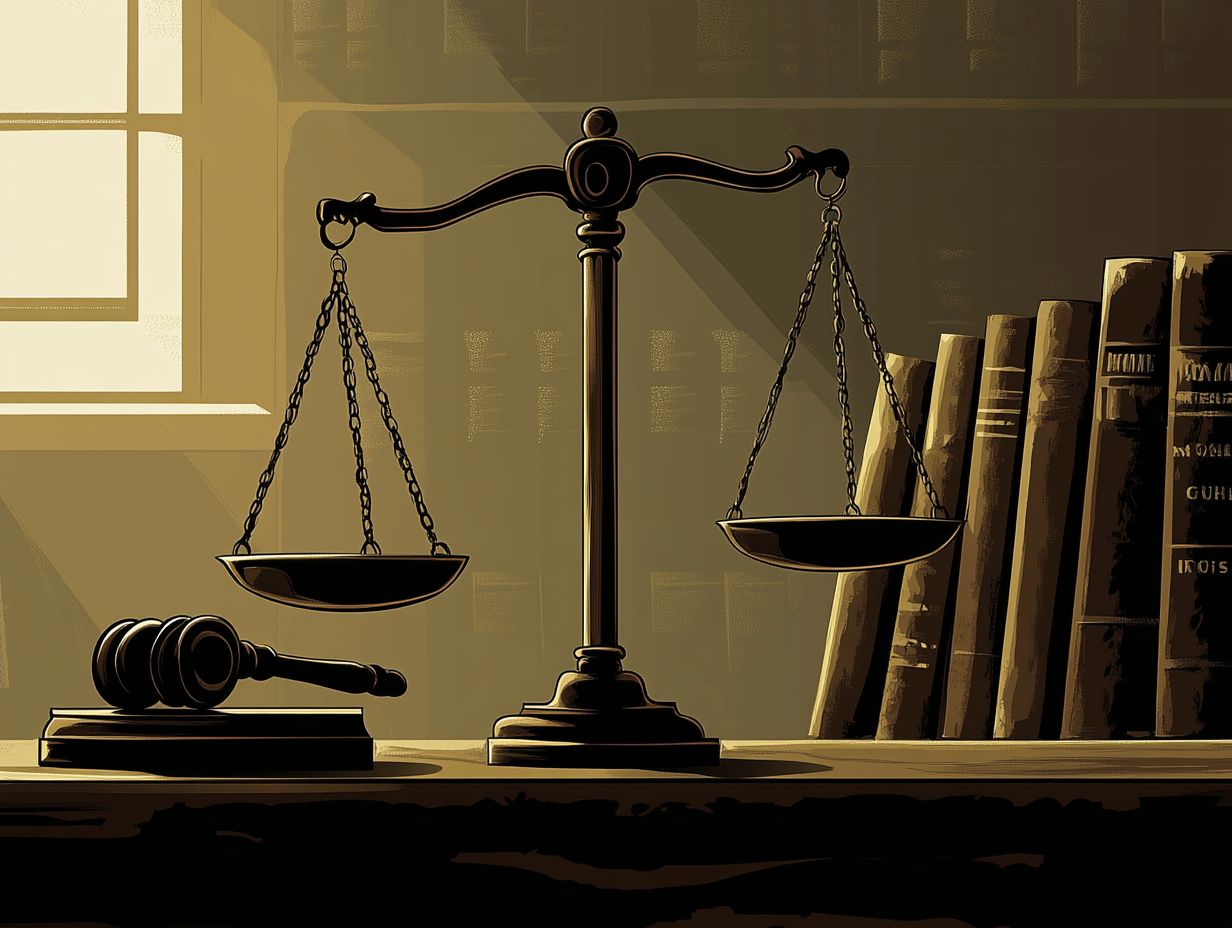
No, the rights of victims and accused individuals differ. Accused individuals have the right to remain silent and the right to an attorney, while victims do not have these rights. However, both parties have the right to a fair and impartial trial.
What is the role of victim advocates in the criminal justice system?
Victim advocates are professionals who provide support and assistance to victims throughout the legal process. They help victims understand their rights, provide emotional support, and connect them with resources such as counseling services.
What rights do accused individuals have in the criminal justice system?
Accused individuals have the right to a fair and speedy trial, the right to be presumed innocent until proven guilty, and the right to confront their accusers. They also have the right to due process and to be free from cruel and unusual punishment.
Can a victim’s rights conflict with the accused’s rights?
Yes, a victim’s rights can sometimes conflict with the accused’s rights.
For instance, a victim may seek a harsh punishment, while the accused may push for a lighter sentence.
In these situations, the court must balance everyone s rights and make a fair decision.
How can I learn more about the rights of victims and the accused?
To learn more, research your state’s laws on victims and the accused.
You can also contact help groups or consult a lawyer for detailed information.

